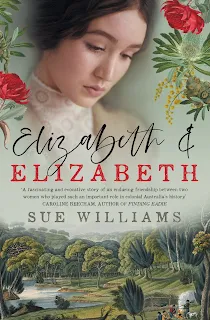INTRO
While I was reading The Last Reunion by Kayte Nunn set in the 1940s, guest reviewer Neil Béchervaise stepped back in time to colonial Australia and shares his review of Elizabeth & Elizabeth by Australian author Sue Williams.NEIL'S REVIEW
Many readers, I am sure, will be attracted to the stories of friendship and tension between two pioneering women in the early 1800s colony of New South Wales. Their tenuous initial contact, their starkly contrasting levels of privation, their losses of children and their developing recognition of common interests make for a powerful reading experience.The timeliness of Elizabeth & Elizabeth, however, makes it a compelling reminder of how little has actually changed in the former British colonies now called Australia.
2021 marks the 213th anniversary of William Bligh’s appointment as governor of the colony with the support of Sir Joseph Banks, who had accompanied James Cook into Botany Bay several years before and declared it the perfect place to ship convicts. Coincidentally, it also marks the 150th anniversary of the publication of The Origin of Species in which Charles Darwin submitted his highly controversial theory that humans had evolved from apes. Sadly, there are still those who deny the social rights of anyone with a criminal record, regardless of their having ‘served their time’ and seeking to return to a respectable place in society.
Little, it seems has changed in Australia in the past 200 years. Refugees are still held in separated facilities, even on offshore islands; the streets of large cities (and small) still home the homelessness as others seek to provide public health and housing for them. Elizabeth Macquarie’s pursuit of civil treatment for the colony’s early settlers – whether freed convicts or poor migrants – remains a political football still largely resisted by those who might afford to resolve the problem. Farm work is still seen as a lowly occupation, best undertaken by migrant back-packers and students through deals which leave them tenuously employed and underpaid.
In contrast, Elizabeth MacArthur’s farming life, spent largely in isolation from her husband, offers a resilient woman raising a family while developing the wool export market which resulted in the claim that Australia lived ‘on the sheep’s back’. That it now probably lives more on the miner’s back is ironic when we regard the equally pioneering efforts of some of our more famous mining women – still largely in the reputational shadows of their husbands and the companies they now manage.
Certainly, Elizabeth & Elizabeth provides a wonderful celebration of the lives of two Australian pioneers who fought for, and achieved, many of the goals we take for granted; two women who brought imagination, tenacity and creative ability to a male-dominated, militarily administered outland where human rights were controlled by the rich and privileged; two women who, in starkly different ways, sought to re-vision Australia for an unimaginable but socially and economically sustainable future.
With Elizabeth & Elizabeth, Sue Williams presents an historical background for a country which may now have one of the most diverse ethnic backgrounds in the modern world, one of the most complex socio-cultural structures in the world, but which retains too many of the progress-resistant political structures that were identified by the time of the landing of the second fleet of convicts in the colony of New South Wales. A colony which had already rebelled against bullying, land grabbing and corrupt, manipulative structures which still largely deny the very rights that Sue Williams' heroic women were struggling for.
With Elizabeth & Elizabeth, Sue Williams offers a highly entertaining introduction to the early development of the British penal colony which has become Australia. For readers with an interest in the country’s early history, Williams' historical novel provides a compelling basis for discussion of our prevailing attitudes to our indigenous ancestors, to our current values and social attitudes and to our right to claim a respectable place in the modern world that is the 21st century.





































Wonderful review
ReplyDeleteThanks Shelleyrae!
Delete